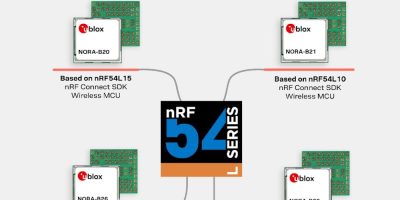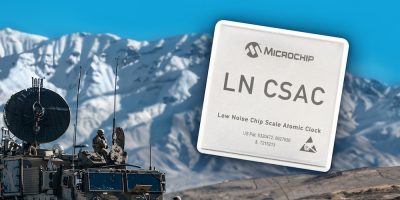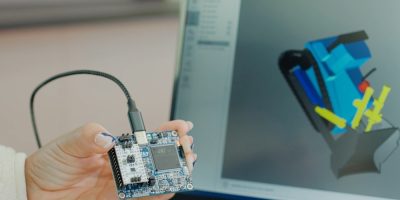u-blox has expanded its portfolio by introducing six new variants of the NORA-B2 Bluetooth Low Energy modules. Now integrating the entire range of Nordic Semiconductor’s next-level nRF54L Series of ultra-low power wireless Systems-on-Chip (SoCs), NORA-B2 offers a versatile solution for mass market segments thanks to its choices of antennas, architectures and chipsets.
The wireless modules combine ultra-lower power consumption and high processing efficiency, consuming up to 50% less current than previous-generation devices while doubling process capacity. They also security features, which makes them ideal for a wide range of IoT applications, such as smart home devices, industrial automation, or healthcare.
The entire NORA-B2 series comprises four variants that differ in memory sizes, design architectures and price levels to match almost any device manufacturer’s requirements.
• NORA-B20 features an ultra-low power nRF54L15 SoC with a 128 MHz Arm Cortex-M33, RISC-V co-processor, and 2.4 GHz multiprotocol radio. It includes 1.5 MB NVM and 256 KB RAM.
• NORA-B21, built on the nRF54L10 SoC, supports multiple wireless protocols (Bluetooth LE, Mesh, Thread, Matter, Zigbee, Amazon Sidewalk) with 1.0 MB NVM and 192 KB RAM.
• NORA-B22 is a cost-effective option with up to 31 GPIOs, 0.5 MB NVM, and 96 KB RAM.
• NORA-B26 is pre-flashed with u-blox u-connectXpress, enabling easy Bluetooth integration without prior expertise.
All NORA-B2 modules are designed for PSA Certified Level 3 security. They incorporate features such as secure boot and updates, tamper detection, and secure firmware over-the-air (FOTA) updates. These security measures ensure that IoT devices remain protected against any potential threats, safeguarding both data and functionality. NORA-B2 modules are also qualified against Bluetooth Core 6.0 that includes Channel Sounding, enabling endless cost-effective possibilities in tracking and locating use cases.
NORA-B2 variants either come with an antenna pin for connecting an external antenna of choice or are designed with a patented PCB antenna providing best-in-class RF performance. All module versions come with global certification allowing device manufacturers to launch their products worldwide with minimal effort.
Samples of NORA-B20 are now available. Early samples of NORA-B21 and NORA-B22 are available for evaluation in limited quantities. The pre-release version of u-connectXpress software for NORA-B26 is also available for early adopters.







